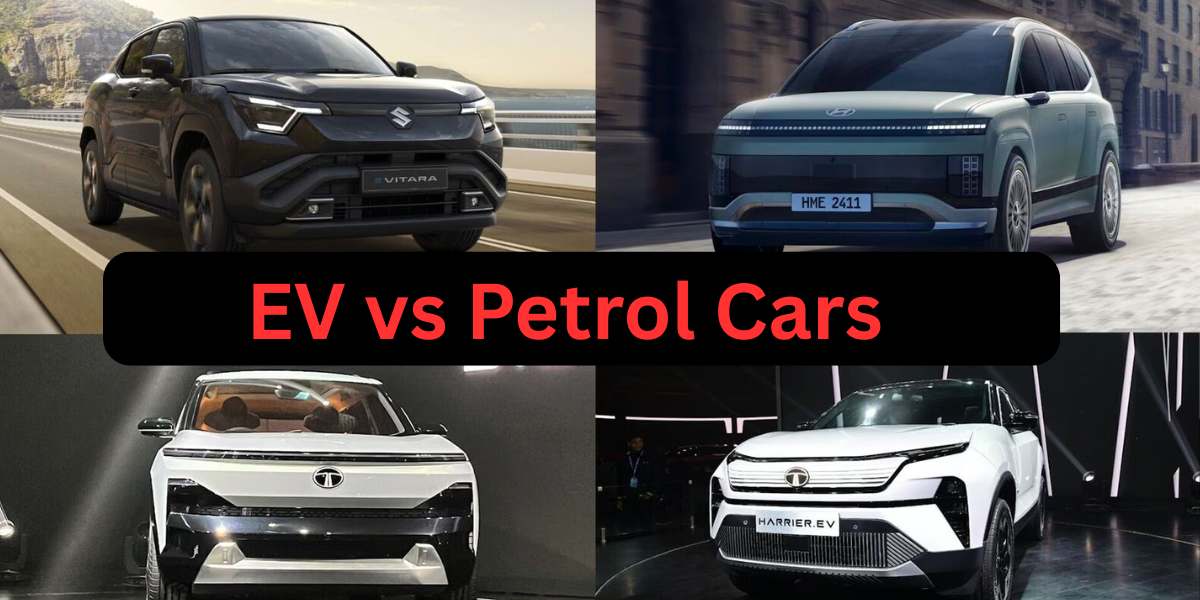In 2025, many people in India are confused about whether to buy an electric vehicle (EV) or stick with a petrol car. EVs are new, cool, and eco-friendly, while petrol cars are known and trusted. But which one is better for your needs, budget, and daily use? This article will help you decide by comparing both types side by side.
Petrol Cars: A Common Choice
✅ Pros of Petrol Cars
- Lower Starting Price: Petrol cars usually cost less than electric ones when you buy them.
- Fuel Stations Everywhere: Petrol is easy to find, even in small towns or highways.
- Good for Long Trips: You can drive long distances without worrying about charging.
❌ Cons of Petrol Cars
- Fuel is Expensive: Petrol prices keep going up, so running costs are high.
- More Servicing Needed: Petrol cars have many parts, which can break or need maintenance.
- Pollution: Petrol cars release smoke and gases that harm the environment.
Electric Vehicles (EVs): Future-Ready Option
✅ Pros of EVs
- Cheaper to Run: Charging an EV is cheaper than filling petrol.
- Low Maintenance: EVs have fewer parts, so they need less servicing.
- Eco-Friendly: EVs don’t release harmful gases, making the air cleaner.
- Government Benefits: The Indian government gives tax cuts and discounts for buying EVs.
❌ Cons of EVs
- High Starting Price: EVs cost more upfront, though prices are coming down.
- Fewer Charging Stations: Some cities have more chargers, but rural areas still lack them.
- Takes Time to Charge: You need to wait longer to charge an EV compared to filling petrol.
Cost Comparison Over 10 Years
| Feature | Petrol Car | Electric Vehicle (EV) |
|---|---|---|
| Purchase Price | ₹7–10 lakh | ₹10–14 lakh |
| Fuel or Charging Cost | ₹4.5 lakh | ₹1 lakh |
| Service/Maintenance | ₹1.5 lakh | ₹0.5 lakh |
| Total Over 10 Years | ₹13 lakh | ₹11.5 lakh |
Note: These are rough estimates and can change based on brand, usage, and location.
If your main goal is to save money upfront and travel long distances easily, petrol cars still make sense in many parts of India. But if you want to save more in the long run, care about the environment, and live in a city with good charging points, an EV could be your best pick. Also, with more support from the government and better technology, EVs are becoming easier to own than ever before.
Frequently Asked Questions (FAQ)
1. Are EVs good for long drives?
EVs are improving, but they still don’t match petrol cars for long-distance driving unless you plan your route around charging stations.
2. How long does it take to charge an EV?
Using a fast charger, it takes around 60-90 minutes. With a normal home charger, it can take 6–8 hours.
3. Is it safe to drive EVs in heavy rain or floods?
Yes, EVs are tested for Indian weather and are generally safe in rain. But just like petrol cars, driving in floods should be avoided.
4. Do EVs need servicing?
Yes, but much less than petrol cars. They have fewer moving parts, which means fewer problems.
5. Which cities in India have the best EV support?
Major cities like Delhi, Mumbai, Bengaluru, and Hyderabad have more charging points and better EV facilities.














